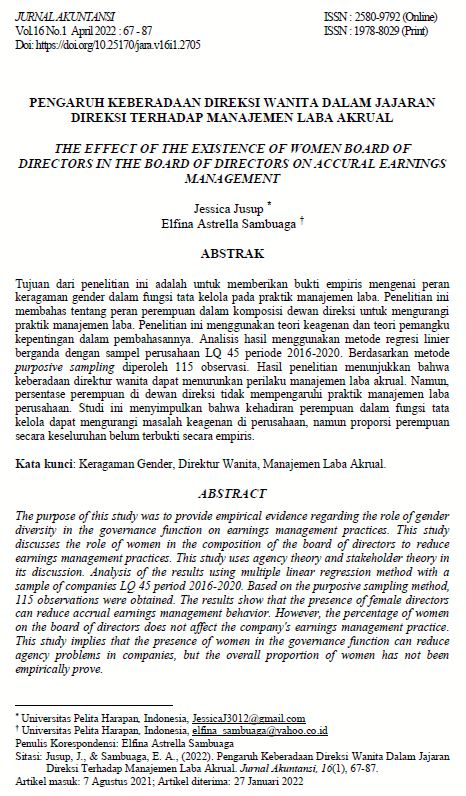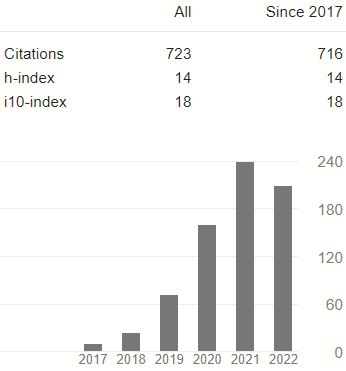PENGARUH KEBERAGAMAN GENDER DEWAN DIREKSI TERHADAP MANAJEMEN LABA AKRUAL
DOI:
https://doi.org/10.25170/jak.v16i1.2705Keywords:
Female directors, accrual earnings management, gender diversityAbstract
The purpose of this study was to examine whether there is an effect on the presence of women on the board of directors and the percentage of women directors on accrual earnings management behavior. This research begins with the assumption that the presence of women on the board of directors and the percentage of women board of directors can reduce the occurrence of earnings management practices, by taking samples using companies that are included in LQ 45 during 2016-2020, so the number of observations is 115, and using purposive sampling as a data collection technique. Based on the two proposed hypotheses, the existence of female directors has a negative effect on accrual earnings management behavior and the percentage of female directors has a negative effect on earnings management behavior. Therefore, the results of the study show that the presence of women on the board of directors has a negative effect on earnings management, while the percentage of female directors has a positive effect on earnings management.
References
Arioglu, E. (2020). The affiliations and characteristics of female directors and earnings management: evidence from Turkey. Managerial Auditing Journal, 35(7), 927-953.
Arun, T., Almahrog, Y., & Ali Aribi, Z. (2015). Female directors and earnings management: Evidence from UK companies. International Review Of Financial Analysis, 39, 137-146.
Gull, A., Nekhili, M., Nagati, H., & Chtioui, T. (2018). Beyond gender diversity: How specific attributes of female directors affect earnings management. The British Accounting Review, 50(3), 255-274.
Lin, Z., Liu, M., & Noronha, C. (2016). The Impact of Corporate Governance on Informative Earnings Management in the Chinese Market. Abacus, 52(3), 568-609.
Manita, R., Bruna, M., Dang, R., & Houanti, L. (2018). Board gender diversity and ESG disclosure: evidence from the USA. Journal Of Applied Accounting Research, 19(2), 206-224.
Novilia, O. (2017). Pengaruh Manajemen Puncak Wanita Terhadap Manajemen Laba. Dinamika Akuntansi Keuangan dan Perbankan.
Poletti-Hughes, J., & Briano-Turrent, G. (2019). Gender diversity on the board of directors and corporate risk: A behavioural agency theory perspective. International Review Of Financial Analysis, 62, 80-90.
Putri, A. V., & Prasetyo, K. (2020). The Effect of Good Corporate Governance Mechanism on Earnings Management in Lq-45 Companies. Contemporary Economics, 14(4), 542+.
Riyadh, Hosam Alden & Sukoharsono, Eko & Andayani, Wuryan. (2019). The Impact of Board Characteristics on Earnings Management In The International Oil and Gas Corporations. Academy of Accounting and Financial Studies Journal. 23. 1-26.
Salim, M., & HN, M. (2015). Effect of Good Corporate Governance (GCG) Mechanism on Earning Management Practices and the Impact on Stock Returns (Case Study on LIQUID (lQ 45) Companies Listed in Indonesia Stock Exchange Period 2013-2017). Business And Management Studies, 5(3), 11.
Vitolla, F., Raimo, N., & Rubino, M. (2019). Board characteristics and integrated reporting quality: an agency theory perspective. Corporate Social Responsibility And Environmental Management, 27(2), 1152-1163.
Waweru, N., & Prot, N. (2018). Corporate governance compliance and accrual earnings management in eastern Africa. Managerial Auditing Journal, 33(2), 171-191.
Zalata, A., Ntim, C., Choudhry, T., Hassanein, A., & Elzahar, H. (2019). Female directors and managerial opportunism: Monitoring versus advisory female directors. The Leadership Quarterly, 30(5), 101309.

Downloads
Published
Issue
Section
License
Authors who publish with this journal agree to the following terms:
- Authors retain copyright and grant the journal right of first publication with the work simultaneously licensed under a Creative Commons Attribution-ShareAlike 4.0 International License that allows others to share the work with an acknowledgment of the work's authorship and initial publication in this journal.
- Authors are able to enter into separate, additional contractual arrangements for the non-exclusive distribution of the journal's published version of the work (e.g., post it to an institutional repository or publish it in a book), with an acknowledgment of its initial publication in this journal.
- Authors are permitted and encouraged to post their work online (e.g., in institutional repositories or on their website) prior to and during the submission process, as it can lead to productive exchanges, as well as earlier and greater citation of published work.














